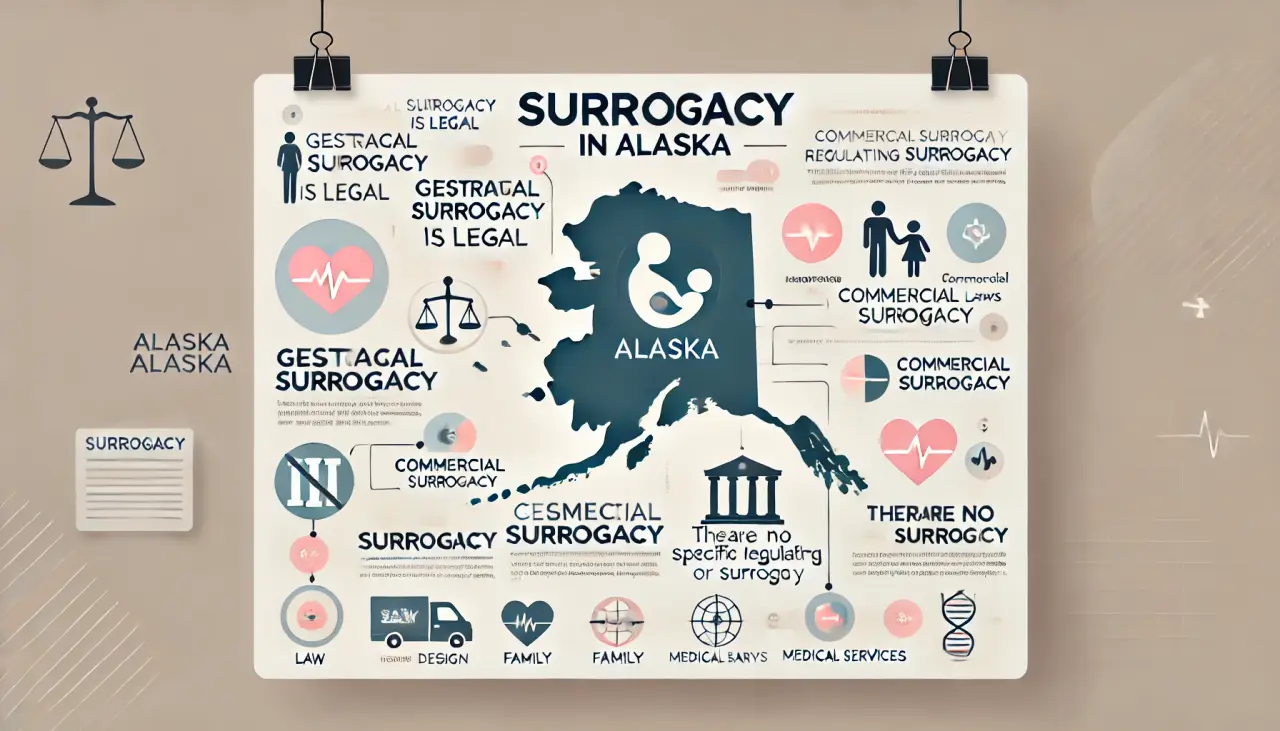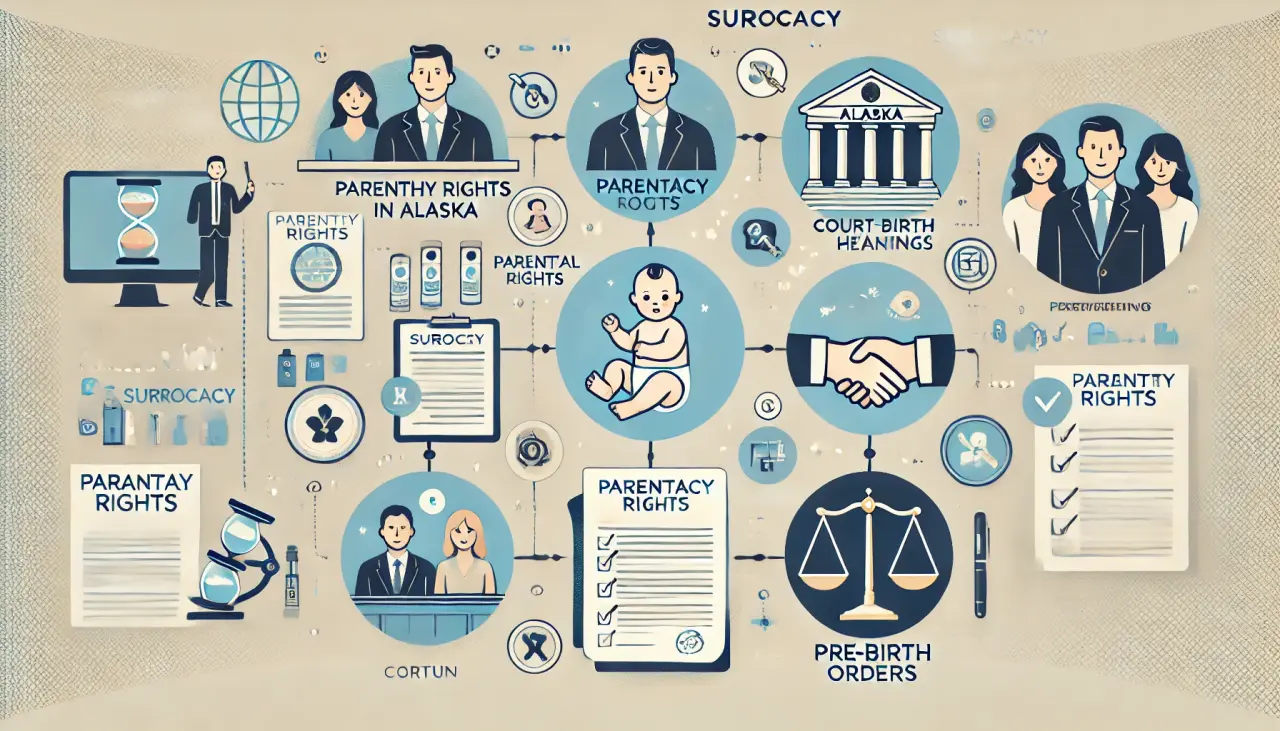
Surrogacy in Alaska: Legal Advice, Parental Rights, and LGBTQ+ Surrogacy Explained
Surrogacy is legal in Alaska, as there are no specific laws or case law either permitting or prohibiting it. Surrogacy agencies in Alaska have developed reliable processes to guide intended parents and surrogate mothers through the surrogacy journey while protecting the rights of everyone involved.
This guide will help you better understand the general rules and regulations surrounding surrogacy in Alaska, though it should not be considered legal advice. It’s important to consult an experienced attorney for personalized guidance on your surrogacy journey, especially if you require surrogacy legal advice in Alaska or are exploring complex matters such as egg and sperm donation.
1. Common Questions About Surrogacy in Alaska
Is gestational surrogacy legal in Alaska?
Yes, gestational surrogacy is legal in Alaska. Since there are no laws or published case law that prohibit or permit gestational surrogacy, it is generally considered legal in the state. Surrogacy agencies in Alaska have a well-established process that ensures a smooth journey for intended parents and surrogate mothers.
Is traditional surrogacy legal in Alaska?
Just like gestational surrogacy, there is no law specifically prohibiting traditional surrogacy, so it is presumed to be legal. However, very few surrogacy lawyers assist with traditional surrogacy, as it is a more complex process with higher legal and emotional risks.
Is commercial surrogacy legal in Alaska?
Yes, commercial surrogacy is legal in Alaska. The state does not set limits on the basic compensation that a surrogate mother can receive. This amount is negotiated in the surrogacy contract between the surrogate mother and the intended parents. In addition to base compensation, the surrogate mother may receive:
- IVF stimulation cycle compensation
- Embryo transfer compensation
- Medication costs for the surrogacy process
- Monthly expense allowance
- Nutritional and clothing budgets for pregnancy
- Travel costs to and from medical clinics/hospitals
- Lost income compensation (if applicable)
- Childcare costs if bed rest is required
- Life and health insurance
- Independent legal counsel
- Psychological counseling fees
- Other costs depending on the surrogacy agency

2. Surrogacy Contracts in Alaska
Although Alaska does not have specific state laws regarding the process of surrogacy contracts, both the intended parents and the surrogate mother must be represented by separate surrogacy attorneys to ensure that everyone’s rights and interests are protected. These attorneys will help draft agreements covering the following:
- Rights and responsibilities of all parties involved in the surrogacy
- Risks and liabilities, including measures to address them
- Surrogacy compensation and other financial details, including insurance for the surrogate mother
- Agreement on sensitive issues, such as selective reduction or pregnancy termination
- Other important matters
Once the contract is finalized, the medical process for the surrogacy can begin.
3. Establishing Parental Rights in Surrogacy in Alaska
Since 2014, Alaska courts have been issuing pre-birth orders for married heterosexual couples where at least one parent has a genetic connection to the child. It is unclear whether pre-birth orders will be granted in cases involving same-sex couples, unmarried couples, or when one or both intended parents have a genetic connection to the child. These cases may require post-birth adoption.

4. LGBTQ+ Surrogacy in Alaska
Is surrogacy for LGBTQ+ couples legal in Alaska?
Yes, surrogacy for LGBTQ+ couples is legal in Alaska. LGBTQ+ intended parents enjoy the same legal rights as heterosexual couples. They go through essentially the same surrogacy process but may need egg or sperm donation to complete an IVF procedure.
Are there any other laws in Alaska affecting same-sex parenting?
No, there are no laws in Alaska that affect the parental rights of same-sex parents involved in surrogacy.
Can surrogacy contracts (whether commercial or altruistic) be enforced in Alaska?
While surrogacy contracts in Alaska are presumed to be enforceable, it is important to consult with an experienced surrogacy attorney in Alaska to ensure that your surrogacy contract is legally binding.
Are there any special legal requirements for foreign parents engaging in surrogacy in Alaska?
No, there are no specific legal requirements for foreign parents who wish to pursue surrogacy in Alaska. However, it is recommended that international parents consult an immigration lawyer to ensure they follow the proper legal procedures to bring the child home.
When do intended parents need to complete adoption after the child is born?
If only one of the intended parents has a genetic connection to the child, the court in Alaska may require the non-genetic parent to complete a stepparent adoption or second-parent adoption after the child’s birth. Pre-birth orders may not be granted in these cases, making post-birth adoption necessary.
Does Alaska allow stepparent adoption?
While Alaska does not have specific laws for second-parent adoption related to surrogacy, there have been cases of second-parent adoption in the state. The approval of second-parent adoption in Alaska varies depending on the court and the judge overseeing the case.

5. Egg Donation, Sperm Donation, and Embryo Donation in Surrogacy in Alaska
What happens if intended parents use donated eggs, sperm, or embryos?
It is unclear whether a pre-birth order will be granted when intended parents use donated eggs, sperm, or embryos. In these cases, post-birth adoption may be required. The likelihood of receiving a pre-birth order depends on the county where the intended parents reside and the judge overseeing the surrogacy case.
In conclusion, while Alaska does not have specific laws regulating surrogacy, the state provides a legal environment for surrogacy to occur with the appropriate legal and medical protections. It’s crucial to work with experienced surrogacy agencies and attorneys to ensure the process is smooth and everyone’s rights are protected. For further guidance, consult an attorney, especially if you are dealing with issues like egg or sperm donation or LGBTQ+ surrogacy.